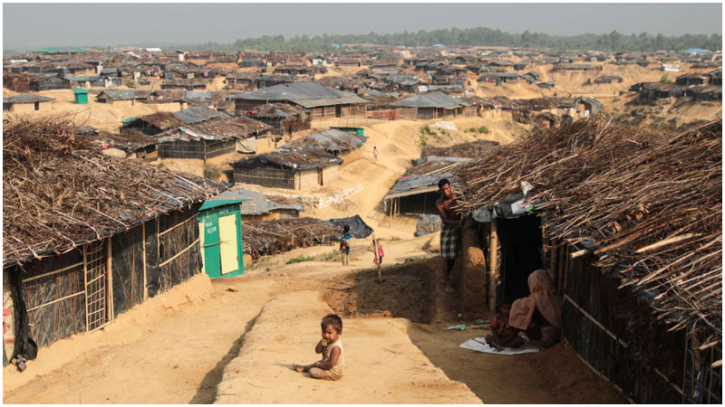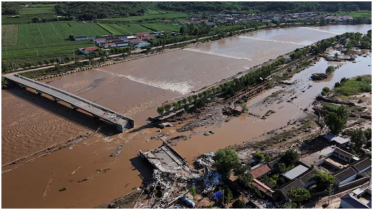Rohingya crisis grows more complicated

Eight years ago today, the Rohingya exodus into Bangladesh began as they fled genocide in Rakhine. Since then, they have not been repatriated. Although repatriation dates were finalised twice, it never materialised. Instead, over the past one and a half years, an additional 124,000 Rohingya have entered Bangladesh.
The power equation in Rakhine, their homeland, has shifted. At the same time, regional and global dynamics have caused the Rohingya issue to lose international attention.
Meanwhile, some Rohingya have involved in crimes. Many fall prey to human traffickers. Murders and rapes occur one after another. Cases of kidnapping for ransom and robbery are on the rise. Drugs and illegal arms are spreading.
Humanitarian aid is also declining, as international assistance has dropped. Many schools for children have shut down. Overall, frustration is deepening among the Rohingya.
In this context, the interim government is organising three international conferences on the Rohingya crisis. The first begins today (Monday) in Cox’s Bazar, with Chief Adviser Professor Muhammad Yunus attending as the chief guest. The other two will be held on 30 September in New York, USA, and on 6 December in Qatar.
Refugee Relief and Repatriation Commissioner (RRRC) and Additional Secretary Mohammad Mizanur Rahman told Prothom Alo that although repatriation is complicated, the government’s efforts continue. “We can hope for something positive from these conferences,” he said.
In 2017, Myanmar’s military launched genocide under the pretext of “Rohingya militant attacks” at border outposts. Hundreds of thousands fled to Bangladesh to save their lives. Many arrived afterward as well. Along with earlier arrivals, the registered Rohingya population now exceeds 1.4 million across 33 camps in Ukhiya and Teknaf, Cox’s Bazar. Beyond the registered, many more remain unlisted.
Rohingya in camps receive food and aid under the Joint Response Plan (JRP), to which several countries contribute, the United States being the largest donor. However, after Donald Trump became president, US aid was reduced.
For 2025, USD 934 million was sought under the JRP. By July, after seven months, only 35 per cent had been secured.
Sanjiada Akhter, a Rohingya mother of four in Teknaf’s Shalbon camp, said the aid provided is insufficient. In the monsoon, there is the risk of landslides in the camp; in winter, the fear of burning to death in fires, and always a sense of insecurity. They want to return home quickly, she said.
Rohingya leader Salamat Ullah said that due to the funding crisis, 3,000 learning centres have shut down in the camps, leaving more than 400,000 children deprived of education.
About 600,000 adolescents and youths are anxious about their future. If repatriation is delayed, some will fall victim to trafficking, while others will drift into crime, he warned.
246 murders in 8 years
Police and Rohingya leaders provided crime statistics. Their information shows that in the past eight years, 263 people have been killed inside the camps. During this period, 4,054 cases were filed implicating 9,033 Rohingya. But identifying and arresting suspects among 1.4 million people remains difficult.
In eight years, 2,589 drug cases were filed against 3,935 Rohingya, but many culprits remain at large. Similarly, 418 weapons cases led to 873 accused, though many identified individuals have not been brought under law.
Over the past one and a half years, 34 Rohingya were accused in 38 cases of rape and attempted rape. In 37 abduction cases, there were 89 charged while in 17 human trafficking cases, there were 18 accused.
Conflict prevails in Rakhine
Conditions in Rakhine continue to deteriorate. Multiple border sources report that armed groups, including the Arakan Salvation Army (ARSA), Arakan Rohingya Solidarity Organisation (ARSO), and Arakan Rohingya Army (ARA) — are launching attacks to dislodge the Arakan Army from border outposts under its control.
As a result, some Rohingya have been displaced again and are attempting to flee into Bangladesh. There are no signs of stability in Rakhine, making repatriation prospects extremely slim.
During Ramadan 2024, while visiting the camps alongside UN Secretary-General António Guterres, Chief Adviser Professor Muhammad Yunus told Rohingya refugees that they would be able to perform next Eid al-Adha prayers back in Rakhine. His words brought them joy, but little progress has since been made.
Syed Hossain, 53, a Rohingya living in Ukhiya’s Lombashia camp, told Prothom Alo, Eight years have passed in a shelter, but there is no sign of returning to our birthplace, Arakan (Rakhine State).— Prothom Alo.
.png)




